Archives - Page 2
-

Authenticity
No. 12 (2011)‘Every now and then a critic or a reader writes to say that some character of mine declares things that are too modern, and in every one of these instances, and only in these instances, I was actually quoting fourteenth-century texts.’
–Umberto Eco, ‘Epilogue to The Name of the Rose’

The idea of ‘authenticity’ assumes that a work can be ‘genuine’, ‘authoritative’, ‘legitimate’: rooted in fact or truth. Yet the possibility of ‘authentic’ representation has always been haunted by the prospect of its antithesis, the ‘fake’ or fraud, and both have become increasingly difficult to define in our globalising world. ‘Authenticity’ – whether it is accepted, invoked, or defied – has remained a dominant construct throughout centuries of cultural production, and is the foundation of many academic discussions that continuously restructure and redefine the concept. This issue of FORUM seeks to explore the notion of authenticity as it relates to areas of culture and the arts.
Editors: Elysse T. Meredith & Dorothy Butchard
Editorial Review Panel: Laura Chapot*, Elena-Adriana Dancu*, Sara Day, Marc Di Sotto, Emma Harper*, Nathalie Ingrassia, James Leveque*, Ruth Mahony, Roisin McCloskey, Matt Mendez, Ana Moraes, Irina Navolochnaya, Emma Paul, Lucy Pearse, Eleanor Pender, Kara Schunk, Maxim Shadurski, Mary Kate Sherwood, Lizzie Stewart, Julia Tulloh, Fran Tomlin, Barbara Vrachnas*, Thomas Whitehead. Article Editors are marked with a star(*)
-

Identity
No. 11 (2010)How do we go about answering the question 'Who am I'? Identity provides an important means of understanding the world, from the individual to the collective. Globalisation and modern technologies gather and separate individuals and communities, creating and redefining both singular and shared identities. Historical concepts and personas are re-imagined through contemporary lenses, modifying past identities while affecting modern views of the self. Much has been made of the freedom and power of fluid, shifting, and multiple identities, yet the notion of an authentic and essential identity remains. Such contestations are part of the language used to discuss identity, as the phrase 'identity crisis' indicates. Identity can be 'found' and 'lost', disputed, negotiated, and subverted.

How is identity formed, maintained, and defined? How far does identity rely on differentiation, and how much on identification? Is identity constructed, or intrinsic? Does it change, and if so, how? How can identity be approached, (re)presented, and analysed in art, film, literature, media, music, and theatre? With increasing globalisation and rapidly changing technology, we are challenged to both redefine and protect identity on multiple levels. How has this affected views, portrayals, and performance of identities? Conversely, how has identity been portrayed and constructed in the past?
Editors: Siobhan Fitzgerald & Elysse T. Meredith
-

Space/s
No. 10 (2010)With the invention of the internet - that infinite cyber space - our world has both radically expanded and contracted. Opened up, as our practice of interacting with others has been drastically changed; but contracted, as this freedom has altered our experience of spatial distance forever. Older technological advances, such as the invention of air travel, initiated this movement by enabling us to traverse and therefore grasp space in new ways. But it is not just our conception of material space that has altered; the impact has also changed our experience of mental space as well. Our world, our cities, our domestic, private, and public spaces have undergone a drastic re-definition; these new spaces have forced a change in our understanding of the nature of space itself.
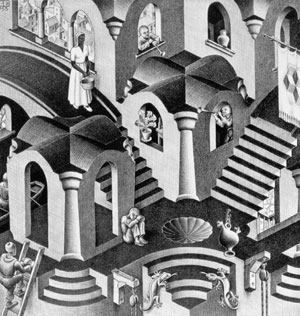
How do we approach these changes and the questions they raise in film, art, music, literature, theatre, and media? In what ways have our changing relations with space altered our understanding of previous spatial conceptions? What does the future hold for our sense of space in a world composed of so many different kinds of spaces, non-spaces, and gaps in space? These changes have affected not only physical and mental space, but the very idea of space itself - its boundaries, its construction, its manipulation. To speak of space in these terms suggests that it is graspable, controllable, and claimable; how does this conception of space relate to the idea that it is negation itself? What exactly are we talking of when we try to articulate "space"?
Editors: Ally Crockford & Siobhan Fitzgerald
-

Voice/s
No. 09 (2009)Voice stands as a defining feature of the arts; even its absence is crucial to interpreting meaning. The issue of voice is central to cultures throughout history, to different genres, styles, and periods. A voice of the people, a voice of one's own, and a writer's voice - each depicts the importance of voice to subjectivity and subject-formation, to origins and originality. Stephen M. Ross describes voice as the essence of a story, noting that "a story - its persons and places, its deeds and disappointments - may be nothing more than the voice that tells it." The same is true for a story told in any medium, through art, music, film, drama, literature: it has, in Ross's words, "no existence without voice, before or after voice, beyond or behind voice."

Voice serves a crucial role in the development of our own subjectivity and sense of identity, but can there be such a thing as an objective voice? We need to problematise the concept of voice, its possible meanings and implications. How can voices be employed and created in different mediums, and to what effect? Who is given a voice, to whom is it denied, and what are the implications of voice versus silence? And what of non-human voices? How are voices used in dialogue to explore, to express, to create, to question? How has voice been wielded to achieve such aims, and can it be? Can it be truly captured, can it be manipulated?
Editors: Lena Wånggren & Ally Crockford
-

Technologies
No. 08 (2009)Technologies allow us to interrogate what material objects, techniques and systems of knowledge are made and how they are produced.

The 8th issue of FORUM engages with a range of questions concerning the definitions, meanings, applications and representations of technologies. The three guest articles by distinguished technology scholars deal with technologies and embodiment in Doctor Who, Marcuse's aesthetics, and the figure of the independent inventor. The following articles explore the significance of technologies across the fields of literary and film studies, history and art history as well as media studies.
The wide variety of articles from different disciplines highlight the interdisciplinary nature of technologies, and the complexity of the term 'technology' itself.
Editors: Jana Funke & Lena Wånggren
-

Haunting
No. 07 (2008)Haunting is a form of un/knowing.
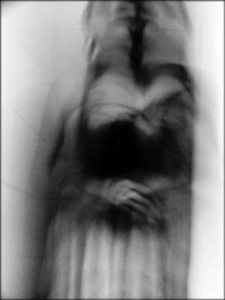
The 7th issue of FORUM engages with haunting and related concepts such as the uncanny, spectrality and the trace by looking at a variety of different texts and contexts. A spirited piece on clipping as an instance of spectral writing is followed by reflections on the apparition in its wide-ranging ontological, epistemological and ethical significance. The articles offer spectral readings of different media from literature and film to the radio and apply the idea of haunting to a variety of topics and issues including intertextuality in Ackroyd, Shakespeare’s agentive objects, the palimpsestic poetics of Argento’s Opera, the spectres of radio technology, post-memory and the Holocaust, and the ethics of Dicken’s ghostly Christmas.
In its entirety, the issue powerfully illustrates the manifold uses of haunting as a means of approaching that which is effaced or absent, but nevertheless makes itself known in unexpected and disruptive ways.
Editors: Jack Burton & Jana Funke
-

Special Issue 02: Play Conference
2008"You can discover more about a person in an hour of play than in a year of conversation."
Plato"Play is the exultation of the possible."
Martin Buber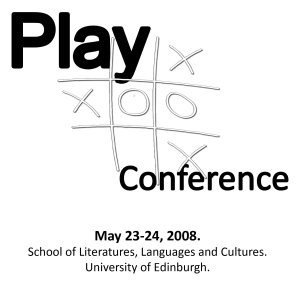
On 23 and 24 May, 2008, FORUM hosted an international and interdisciplinary conference on the topic of "Play" at the University of Edinburgh's School of Literatures, Languages, and Cultures (made possible through funding from the Art and Humanities Research Council). Engaging with a myriad of perspectives and interests – from digital media to theology, literature to film studies, psychology to performance art – the conference explored the social and cultural functions of play, and attempted to determine its significance in the arts and humanities. This special issue of FORUM offers a selection of papers presented at the conference, a compilation of works that reflect the spectrum of questions considered throughout the two-day event. -

Desire
No. 06 (2008)The spring 2008 issue of FORUM explores the concept of desire as a force inspiring works of art within a variety of cinematic and literary genres.

The issue opens with a guest article by Homay King examining the intersection between the “desire to know” and Orientalist elements of mise en scène within the genre of film noir. The discussion of cinematic representations of desire continues with articles on murder and the gaze in 1960s British film and female effigies in contemporary film Lars and the Real Girl. Turning to literature, an analysis of Angela Carter’s novel The Infernal Desire Machines of Doctor Hoffman looks at the function of desire within identity formation; while an essay on Gerard Manley Hopkins’s confessional notes presents a new take on a popular topic: forbidden longing.
In moving between the personal and the universal, the forbidden and the permissible, the articles in this issue present a spectrum of approaches to and understandings of desire and its aesthetic incarnations.
Editors: Kim Richmond & Ana Salzberg
-

Apocalypse Now
No. 05 (2007)Since the beginning the end has always been with us.

Mushroom cloud from the Fat Man bomb over Nagasaki, 9th August 1945
As the 5th issue of FORUM, the University of Edinburgh Postgraduate Journal for Culture and the Arts demonstrates the apocalypse has proved to be a resilient cultural trope throughout human history. Dr Darryl Jones' wide-ranging guest article provides historical context for the treatment of the apocalyptic tone in literature, setting the scene for the literary discussions of the 19th century short stories of Wilkie Collins and George Eliot, the Science Fiction novels of George Turner and the more contemporary concerns of Don Delillo's work. The flexible nature of the apocalyptic theme is reflected in two papers investigating the use of apocalyptic tone in two non-literary media forms, namely the eco-concerns of the films of Rolf de Heers and the sonic experience of the apocalypse in Tom Waits' Bone Machine, while a more philosophical approach is adopted in the discussions of our ability to linguistically comprehend the "end" post-Trinity, and the radical eco-activism of the Earth First! movement.
As this selection of essays proves, attempting to study human conceptions of apocalypse provides a colourfully broad canvas of topics and approaches which, like the literal meaning of the word itself, constantly hint at the "unveiling" of a coherent truth while simultaneously remaining tantalisingly out of reach.
Editors: Jack Burton & Hanna Sommerseth
-

Camp!
No. 04 (2007)From ballet dancers to toilet humour, Pink Flamingos to Douglas Sirk, summer camp to Mick Jagger...
The spring 2007 issue of FORUM engages with the topic of Camp!

Divine in John Waters's Pink Flamingos, 1972
Covering a wide variety of media, the articles consider representations of camp, as well as exploring the potential of camp as a critical interpretative strategy. The edition opens with the classic camp of Carry On films, before moving on to an analysis of the politics of straight camp in hard rock. Personal anecdote is interwoven with a re-examination of Susan Sontag's "Notes on 'Camp'" in our third article, followed by a consideration of the restorative potential of camp in a short story about a man living with HIV. The issue closes with a look at the classic melodrama of Douglas Sirk, interpreting his use of colour within a camp register.
Editors: Clare Bielby & Sally Henderson
-

Chance and Control
No. 03 (2006)The autumn 2006 issue of FORUM addresses the interrelated concepts of chance and control within the arts and culture through a diverse selection of papers examining William Blake's reading of the Bible; the subversive potential of the anecdote in Soviet-era Russia; Kundera's reading of Nietzsche's concept of eternal recurrence in his novel The Unbearable Lightness of Being, and William Burrough's notion of the Controller's Dilemma as an alternative to the Prisoner's Dilemma.
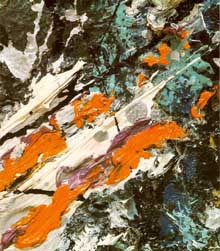
Jackson Pollock - Full Fathom Five, 1947
Whatever your interest in the arts and culture, we are confident you will find something of interest herein.
Editors: Claire Altree & Keith Brown
-

Special Issue 01: Evolutions
2006"We are causing the reversal of evolution."
- James Hart, Eugenic Manifesto
"Come writers and critics
Who prophesize with your pen
And keep your eyes open
The chance won't come again."
- Bob Dylan, "The Times They Are A-Changin"
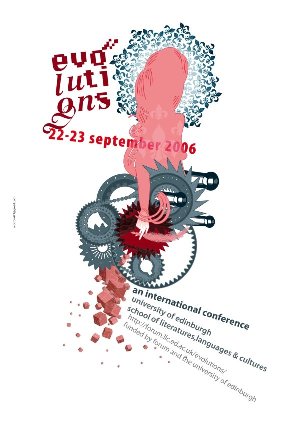
On 22–23 September 2006, the School of Literatures, Languages and Cultures at the University of Edinburgh hosted an international, interdisciplinary conference on the themes of "evolutions," opening discussion to topics as diverse as Mao, the Bible, eugenics, rock music, animal rights, genre, and many others. For these two days, scholars (both students and staff) from across four continents working in the fields of theory, literature, linguistics, music, film, culture, and history came together to talk and share ideas. Below are a natural selection of the papers, expanded and evolved into new and exciting fauna.
-

Fear & Terror
No. 02 (2006)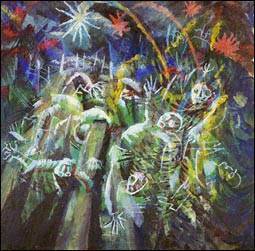
The spring edition of FORUM addresses the interrelated concepts of terror and fear and aims to explore the various ways in which these ideas are addressed within philosophy, art, music, literature and film. Within our contemporary society terror and fear have adopted a new relevancy and, as the arts are direct commentators on the prevalent attitudes of the era, FORUM’s objective is to discover the way in which the arts have confronted terror and fear both within our time and in previous ages.
Editors: Joe Hughes & Beth Schroeder
-

Origins & Originality
No. 01 (2005)The inaugural issue of FORUM, on the theme of "Origins and Originality".
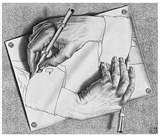
Editors: Lisa Otty & Matt McGuire





